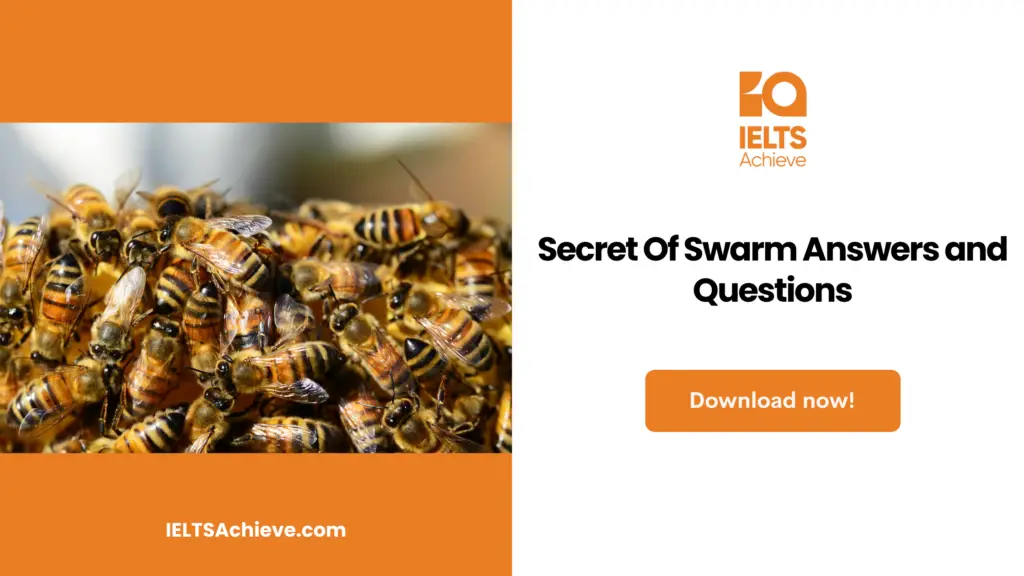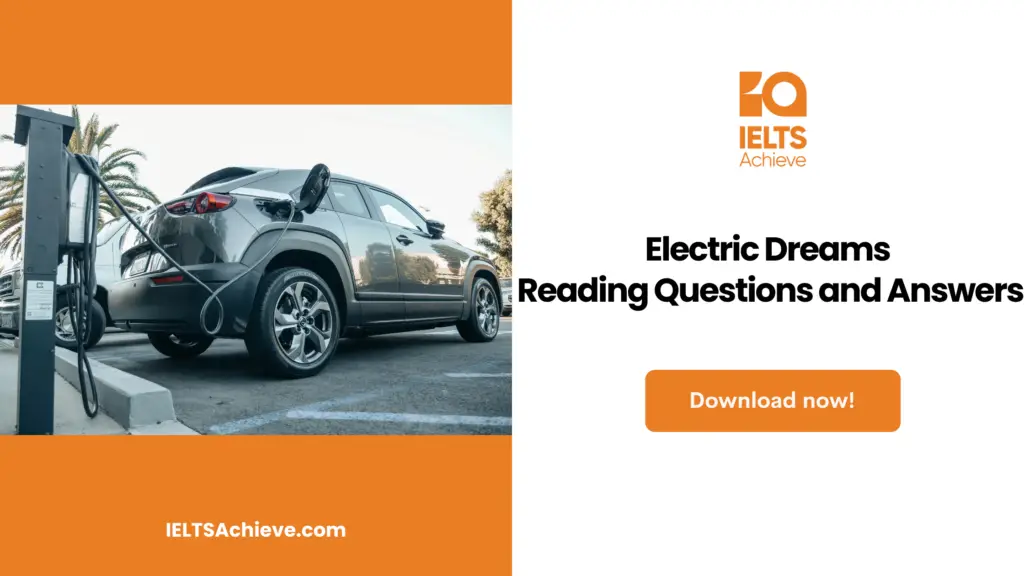The Blog post contains the following IELTS Reading Questions:
- IELTS Reading Flow Chart Completion
- IELTS Reading True False Not Given
- IELTS Reading Matching Sentence Endings
Stay informed and prepared for success – Explore our comprehensive Reading Test Info page to get valuable insights, exam format details, and expert tips for mastering the IELTS Reading section.
IELTS Reading Passage – Secret of Swarm

Secrets of Swarm
Insects, birds, and fish are often the species that people feel the most distanced from. Unlike many animals, they do not participate in human-like behaviour. The method in which they swarm or flock together is also hardly covered by the culinary press. The picture of city commuters marching like worker ants is a frequent one, but it is not a good one. Yet, according to a new school of scientific thought, these swarms may have much to teach us.
American author Peter Miller writes, ‘I used to believe that individual ants understood where they were heading and what they were meant to accomplish upon arrival. Deborah Gordon, a scientist at Stanford University, demonstrated to me that nothing ants conduct makes sense outside of the context of the colony as a whole. Which makes you question whether, as people, we don’t serve a comparable purpose for the organisations where we work and the societies in which we reside.’ Ants lack intelligence on their own. However, as a colony, they make prudent choices. And, as Gordon discovered through her research, no ant makes decisions or issues orders.
Take food collection for instance. No ant determines, “There is a lot of food available today; many ants should go out to get it,” when there is an abundance of food available. Instead, some forager ants go out, and as soon as they locate food, they return to the colony. At the entryway, they transmit a “go out” signal to the reserve foragers by brushing by them. The quicker foragers return, the more food there is, and the quicker other foragers go, till the quantity of food brought back eventually decreases. An organic computation was performed to answer the query, ‘How many foragers does the community need today?’ And if anything goes wrong – for instance, a hungry lizard hunting for an ant lunch – a swarm of ants returning without food sends a “Don’t go out” signal to the waiting reserves.
But could this kind of decentralised control function in a human organisation? Miller visited a Texas gas firm that has effectively employed calculations based on the behaviour of ant colonies to optimise its plants and transportation routes. They invented a computer model based on the principles of self-organisation observed in ant communities as Miller says, “If ant communities have evolved a method for establishing the most effective routes between their nests and food sources, company management reasoned, why not make use of that information? The model is supplied with information about deliveries that must be done the next day, as well as weather conditions, and it generates a simulation identifying the optimal path for delivery vehicles.
Miller notes that it was not until he read a honeybee study by Tom Seeley, a scientist at Cornell University, that he recognised the influence that swarm behaviour may have on people. The honeybees decide together which new nest to migrate into. Initially, scouts fly to different locations to study them. When they return, they perform a “waggle dance” for their location, prompting further scouts to investigate. Numerous bees leave their hives, but none compares all locations. Each gives feedback on just one. The more they enjoyed their nest, the more energetic and prolonged their waggle dance would be, and the more bees would visit it. The volume of bees increases up toward a certain location; it assures that support for the best location snowballs and that the choice is made in the most democratic way possible.
Through a variety of information and a little bit of healthy competition, humans can also make intelligent judgements. Miller states, “The greatest example of shared decision-making I saw during my research was a town meeting in Vermont where people argued their annual budget face-to-face.” For group decision-making to be effective, it is necessary to have a method for filtering through the many possibilities proposed by group members and a method for narrowing these options. Vermont residents govern their local affairs by submitting ideas or supporting the proposals of others until a vote reaches a consensus. As with bees, a wide sample of choices prior to making a decision will often result in an agreeable compromise for everyone. The ‘wisdom of the multitude’ produces intelligent judgments for the benefit of the collective, and leaves people feeling informed and appreciated.
Without physical interaction, we are increasingly demonstrating swarm behaviour on the internet as well. For instance, Miller compares a wiki website to a termite hill. Information-sharing websites are based on the fundamental idea of indirect cooperation, exactly as termites develop their intricate structures. Termites lack a plan from an architect or a great building design. They merely detect changes in their surroundings, such as when the mound’s wall has been damaged, changing the airflow. They go to the location of the change and put a grain of dirt there. When another termite discovers the grain, it too will discard it. When another termite discovers the grain, it too will discard it. A termite mound is comparable to a wiki website in this regard. Instead of discussing what we want to share online in person, we just add to what someone else, perhaps a stranger on the other side of the world, has already written. This indirect knowledge and skill-sharing is now reaching the halls of power.
Stay informed and prepared for success – Explore our comprehensive Reading Test Info page to get valuable insights, exam format details, and expert tips for mastering the IELTS Reading section.
Secret of swarm IELTS Reading Questions
Questions 1-4
Complete the flow-chart. Write NO MORE THAN TWO WORDS from the passage for each answer.
| How honeybees choose a new nest |
| Honeybee 1. _______ research potential online locations |
| Upon their return, they perform 2. ________ |
| Other bees are active and report back |
| Enthusiasm and 3. ________ increase for one particular site |
| A decision is made utilising a 4. ______ procedure |
Boost your performance in Summary, Notes, Table, and Flowchart Completion tasks. Click here to explore our detailed guide and learn how to effectively complete summaries, notes, tables, and flowcharts in the IELTS Reading section.
Questions 5-10
Answer the question from True/ False or Not Given.
TRUE if the statement agrees with the information
FALSE if the statement contradicts the information
NOT GIVEN if there is no information on this
5. Commuters are sometimes likened to worker ants in a positive light.
6. Certain ants within a colony have leadership positions.
7. Forager ants communicate the distance to the food source.
8. Forager ants can respond rapidly to potentially threatening circumstances.
9. Wind may cause damage to termite mounds.
10. Termites construct their nests without interacting directly with one another.
Enhance your skills in identifying information as True, False, or Not Given. Click here to discover expert strategies and techniques for mastering this question type in the IELTS Reading section.
Questions 11-13
Complete the sentence with the correct ending, A-F, below.
11. Citizens in an annual Vermont meeting
12. Managers working for a Texas gas company
13. Some internet users
- To develop vast and complex systems, use descriptive comments.
- Provide support for each other’s ideas in order to reach the best outcome.
- Communicate with each other to determine who the leader will be.
- Repair structures they have built without directly communicating with one another.
- Use decision-making processes based on insect communities to improve their service.
- Contribute independently to the thoughts of others they do not know.
Ready to sharpen your skills in Matching Sentence Endings? Click here to discover expert strategies and techniques for accurately matching sentence endings with the corresponding information in the IELTS Reading section.
Unlock your full potential in the IELTS Reading section – Visit our IELTS Reading Practice Question Answer page now!
Recommended Questions:
Renewable Energy IELTS Reading Question with Answer
Secret Of Swarm Reading Answers
1. Scouts
2. Waggle dance
3. Volume
4. Democratic
5. False
6. False
7. Not Given
8. True
9. Not Given
10. True
11. B
12. E
13. F

We hope you found this post useful in helping you to study for the IELTS Test. If you have any questions please let us know in the comments below or on the Facebook page.
The best way to keep up to date with posts like this is to like us on Facebook, then follow us on Instagram and Pinterest. If you need help preparing for the IELTS Test, join the IELTS Achieve Academy and see how we can assist you to achieve your desired band score. We offer an essay correction service, mock exams and online courses.

